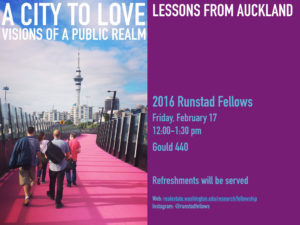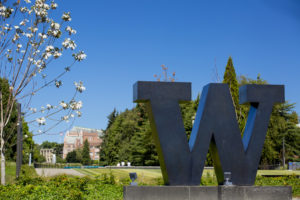Arthur Acolin, Associate Professor and Bob Filley Endowed Chair in the Runstad Department of Real Estate, was recently awarded an NIH R21 grant for his project entitled ‘Gentrification, Mobility, and Exposure to Contextual Determinants of Health.’
Category: News
Opinion: Density is necessary but insufficient to ease the housing crisis
“We believe, and the vast majority of the scholarly evidence corroborates, that density is a necessary but insufficient condition for addressing the housing affordability crisis,” writes Gregg Colburn, assistant professor of real estate, and Rick Mohler, associate professor of architecture. | The Seattle Times
Access and recovery: A conversation about the transitional housing of individuals experiencing homelessness
Professor Gregg Colburn weighs in on the benefits of housing individuals experiencing homelessness in hotels, a program adopted by King County at the beginning of the COVID-19 pandemic. | The Daily
2016 Runstad Center Affiliate Fellows Present: A City to Love
Please join us for the 2016 Runstad Center Affiliate Fellows final presentation of their research from Auckland, New Zealand. They have explored the ways in which a city can rapidly transform the function and capacity of the public right of way to support a rich urban life at a time of unprecedented population growth. A relevant topic indeed!

A CITY TO LOVE
VISIONS OF A PUBLIC REALM
Friday, February 17, 2017
12:00-1:30 pm
Gould Hall, room 440
3950 University Ave NE
Seattle, WA 98195
Refreshments will be served, please RSVP to bestm2@uw.edu
The Runstad Center Affiliate Fellows Program gathers thought leaders from industry, faculty, and Master of Science in Real Estate students to examine real estate issues in cities around the globe. The 2016 Runstad Affiliate Fellows are Rick Mohler, Barbara Swift, Joe David, Giovanni Migliaccio, Genevieve Hale-Case, Amy Hartman, and Ben Broesamle.
Financial and macro-economic factors in global real estate markets
The last three decades have seen increased integration across global stock markets. New research from the Runstad Center of Real Estate Studies at the University of Washington has examined what factors drive international integration across public real estate markets. The research has implications for fund managers as increased integration can have a negative impact upon the diversification opportunities available across global real estate markets. The findings observe that whilst public real estate markets have become more inter-connected, both the level and increase in integration is less than that observed in stock markets generally.
The research, authored by Simon Stevenson, John and Rosalind Jacobi Family Professor of Real Estate and Director of the Runstad Center, also considers how financial and macro-economic factors impact the extent of co-movement across markets. The results highlight that those countries with heightened financial and trade openness and display monetary independence see increased integration. The stability of respective the foreign exchange rate also has a significant impact.
Financial market factors, both specific to public real estate as well as the broader stock market, are also important. The paper finds that increased integration is observed in countries with larger stock markets, which are themselves more integrated with the global market, whilst the size of the public real estate market also plays an role. Specifically, public real estate markets that constitute a larger proportion of the overall domestic stock market, also tend to display increased integration. Factors such as volatility and trading volume in public real estate stocks are also important elements.
The paper, “Macroeconomic and Financial Determinants of Co-Movement across Global Real Estate Security Markets” is published in the latest issue of the Journal of Real Estate Research, the primary publication of the American Real Estate Society.
Faculty search underway for undergraduate courses
The University of Washington’s Department of Urban Design and Planning and the Runstad Center are seeking two affiliate part-time instructors for the spring quarter to teach a Real Estate Market analysis course and an Accounting for Real Estate course. The instruction dates are from March 28th through June 1st with exam week being from June 5-9th. For additional information and material submission please contact Prof. Sofia Dermisi at sdermisi@uw.edu The application deadline is February 10th, 2017 and specific information regarding the position can be found here
New Undergraduate Initiative in Real Estate
Thanks to a generous endowment from the Jacobi Family and Windermere Real Estate the University of Washington is launching a series of undergraduate classes in real estate. The Director of the Runstad Center for Real Estate Studies, Professor Simon Stevenson, who also holds the John and Rosalind Jacobi Family Chair, described the initiative as an important part of the long-term development of the Real Estate program at UW.
“The development of an undergraduate minor is exciting in many respects. It will complement the well established MSRE program and will also open up real estate and the associated career possibilities to UW’s undergraduate student body. The first class started this quarter and from a standing start it already has over twenty students enrolled. The Intro to Real Estate class will be followed by a Market Analysis course in the Spring Quarter. As more courses are rolled out over the next two years this will develop into a fully-fledged minor in real estate. Everyone in the University of Washington’s College of Built Environments would like to extend our thanks and appreciation to Windermere Real Estate and the Jacobi family for their support and help in developing this exciting initiative”.

What can Seattle learn from Vancouver’s housing mess?
Peter Orser was recently quoted in a Crosscut article about how Seattle could be affected by Vancouver’s collapsing housing market, link to the story here
Keeping building materials green
One of our own, affiliate faculty member Nicole Denamur, wrote an article for the Daily Journal of Commerce this fall regarding environmental issues with building materials. Nicole is an attorney with Pacifica Law Group, a LEED Green Associate and WELL AP, and teaches Risk & Reward in Sustainable Development at the Runstad Center for Real Estate Studies. Read the story here.
Faculty Search
The University of Washington’s Department of Urban Design and Planning and the Runstad Center for Real Estate Studies are seeking applicants for two Assistant Professor positions and one Associate Professor position for the MS in Real Estate.
The appointments will be on a 9-month (100% FTE) basis with salary commensurate with qualifications and experience. Qualified candidates will hold a doctoral degree or foreign equivalent in a related field with expertise in at least one of the following areas; housing, real estate development, real estate finance and investment or corporate real estate and possess a record that demonstrates promise as a researcher and scholar.
Candidates for the Assistant Professor positions should be prepared to teach real estate courses at both the undergraduate and graduate levels. Expertise in affordable housing and housing policy would be viewed favorably for the Associate Professor position. Follow the links below for full descriptions as well as application instructions.